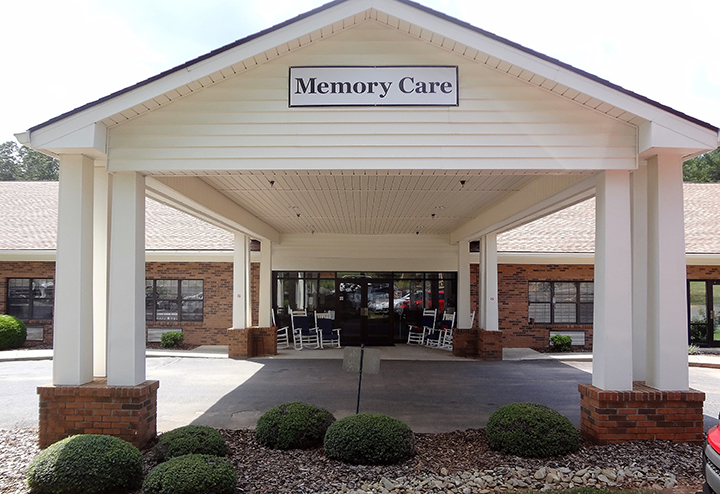Creating a Safe and Supportive Environment for Alzheimer's Care
The production of a risk-free and encouraging setting for individuals with Alzheimer's is critical in boosting their high quality of life. This involves not only physical adaptations within the home, such as minimizing risks and integrating acquainted elements, but additionally the implementation of structured regimens and meaningful tasks that accommodate their cognitive demands. Moreover, comprehending the psychological and mental measurements of treatment can substantially influence their feeling of safety and security and connection. Discovering these diverse approaches can expose essential understandings into efficient caregiving approaches that might transform the day-to-day experiences of both individuals and caretakers.
Comprehending Alzheimer's Requirements
Frequently, individuals with Alzheimer's condition show a variety of needs that call for customized approaches to care. As the condition progresses, cognitive decrease shows up in numerous ways, influencing memory, thinking, and also the ability to do daily tasks. Caretakers need to recognize these advancing requirements to provide appropriate support and guarantee a greater high quality of life for those influenced.
One vital element of comprehending Alzheimer's demands is recognizing the importance of routine and experience. Individuals frequently locate convenience in recognized patterns, which can reduce anxiousness and confusion. Caretakers must strive to develop structured daily routines that incorporate purposeful activities straightened with the person's capacities and rate of interests.
Additionally, reliable communication is paramount. Individuals with Alzheimer's might have a hard time to reveal themselves or comprehend intricate language. Caretakers ought to employ simple, clear language, use non-verbal signs, and method active paying attention to promote understanding and link.
Finally, social and emotional needs can not be overlooked. Giving possibilities for social communication and keeping connections can substantially enhance emotional well-being. Caretakers should motivate interaction in area activities or household events, promoting a sense of belonging and function. Understanding these varied needs is essential for producing an encouraging treatment environment.
Creating a Safe Home
Developing a secure home for people with Alzheimer's illness is important to lessening dangers and promoting freedom. The design of the space must prioritize safety and security while permitting for personal convenience. Initially, eliminate prospective risks such as loose carpets, sharp things, and mess, which can result in falls or crashes. Make certain that paths are clear and well-lit, as correct illumination reduces disorientation and improves wheelchair.
Incorporating adaptive features is likewise vital. Mount grab bars in shower rooms and near stairs, and consider utilizing non-slip mats in damp areas. Furthermore, using contrasting shades for walls and floorings can aid in identifying rooms, aiding to mitigate confusion.
Experience is necessary for people with Alzheimer's. Customizing the setting with acquainted things and photographs can reinforce a sense of belonging and safety - Alzheimers Care Charlotte. It is also valuable to have actually a designated location for daily activities, such as reading or crafting, which can provide structure to their day
Finally, carrying out a secure exterior area allows for secure expedition while getting in touch with nature. By thoughtfully designing the home environment, caretakers can dramatically boost the lifestyle for people coping with Alzheimer's illness.
Enhancing Communication Skills

Non-verbal communication, consisting of faces, motions, and touch, plays a critical duty in communicating empathy and understanding. Maintaining eye get in touch with and a tranquil attitude can improve the convenience level of the individual, advertising a feeling of security.
Moreover, it is vital to exercise energetic listening. This entails being completely existing, showing perseverance, and permitting the individual to express themselves without disruption. Repetition may be essential; caretakers should be prepared to revisit subjects or concerns, as individuals with Alzheimer's might deal with memory recall.
Additionally, using visual help or cues, such as photos or familiar things, can facilitate acknowledgment and interaction. Eventually, boosting interaction skills has to do with constructing count on and developing an environment where people really feel heard, valued, and recognized, consequently improving their high quality of life.
Encouraging Social Interaction
Fostering meaningful social interactions can greatly boost the health of individuals with Alzheimer's illness. Involving with others not just assists battle feelings of isolation however additionally boosts cognitive feature and emotional wellness. Structured social activities, such as group crafts, games and arts, or songs treatment, create opportunities for citizens to get in touch with peers and caretakers, which can lead to check my blog improved mood and minimized anxiousness.
Developing an inviting environment that encourages socialization is essential. This can be achieved by organizing common areas that promote communication, such as cozy seating areas or activity spaces. In addition, including familiar and culturally pertinent activities can spark memories and motivate participation, allowing individuals with Alzheimer's to really feel more linked to their previous experiences.
Furthermore, caretakers must be trained to acknowledge and advertise social interaction amongst residents. By focusing on social interaction, we can dramatically enrich the lives of those living Home Page with Alzheimer's, cultivating a feeling of neighborhood and belonging.
Supporting Caretaker Wellness

To sustain caretakers, companies must supply regular training and instructional resources to improve their understanding of Alzheimer's disease and caregiving strategies. Providing access to break treatment services permits caregivers to take required breaks, minimizing tension and tiredness - Alzheimers Care Charlotte. Additionally, promoting an area with assistance teams can promote emotional sharing and the exchange of useful guidance among caregivers, creating a network of common assistance
Mental wellness resources, such as therapy solutions, can also be important in attending to the emotional toll caregiving can take. By focusing on caregiver wellness, we develop an even more sustainable caregiving atmosphere that not only profits the caregivers themselves yet additionally enhances the overall high quality of treatment gotten by people with Alzheimer's. Ultimately, click here to read supporting caregivers is an essential element in promoting a thoughtful and efficient treatment setup.
Final Thought
In verdict, the development of a secure and helpful environment for people with Alzheimer's is vital to boosting their lifestyle. By prioritizing security with thoughtful design, cultivating psychological wellness with familiar components, and promoting involvement through structured regimens, caretakers can significantly affect the general experience of those impacted by this condition. Sustaining caretaker wellness is essential, as it inevitably contributes to an extra reliable and caring care atmosphere.
Repetition may be essential; caregivers need to be prepared to take another look at topics or inquiries, as people with Alzheimer's might battle with memory recall.
